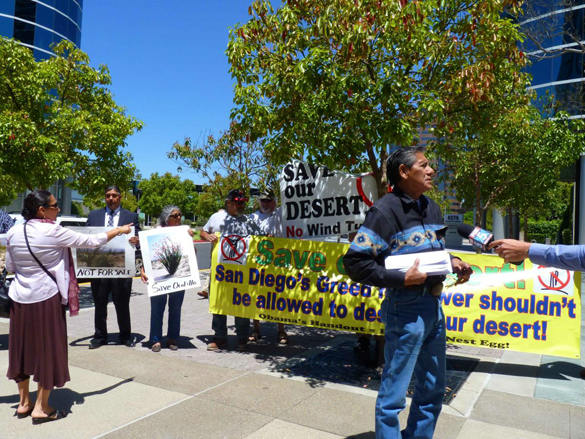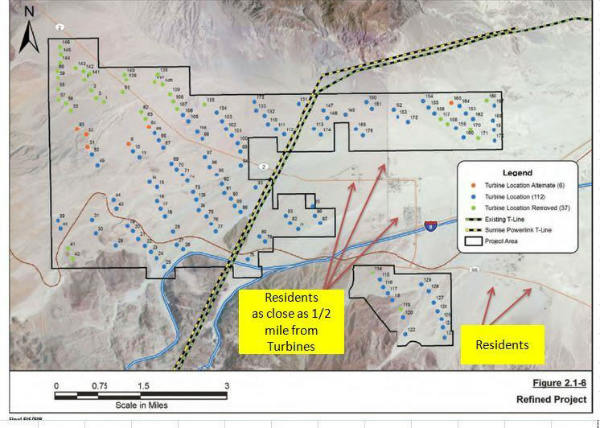
A Federal judge has thrown out the Quechan Nation’s request for an injunction against the controversial Ocotillo Express Wind Project in western Imperial County, California.
The Quechan filed for the injunction on May 14, just three days after the Bureau of Land Management, an agency of the U.S. Department of the Interior, gave “fast-track” approval for the project. The Quechan complaint stated that the Department of Interior, in approving the project, “violated… federal laws, regulations, and policies including the Federal Land Policy and Management Act (FLPMA); National Historic Preservation Act (NHPA); National Environmental Policy Act (NEPA); Administrative Procedures Act (APA); and the CDCA [The California Desert Conservation Area] Plan.”
The complaint went on to explain that the massive 10,150-acre project area contains 287 archaeological sites including geoglyphs, petroglyphs, sleeping circles and other sites of spiritual significance; thousands of artifacts, and at least 12 burial (an exhaustive survey has not been carried out).
Construction of the 112-turbine project would utterly devastate these sites.

Project map by Pattern Energy, with inserts by Jim Pelley
Furthermore, the project jeopardizes the delicate desert ecosystem which is “home to the Federally endangered Peninsular bighorn sheep and the flat-tailed horned lizard, a perennial candidate for listing under the Endangered Species Act,” says Chris Clarke, Director of Desert Biodiversity. “The turbines on the site would stand 450 feet tall with blades more than 180 feet long. With blades of that length, if the turbines spin at a leisurely 10 rpm the speed of the blade tips will approach 140 miles per hour, a serious threat to the region’s migratory birds — including the protected golden eagle,” he continues.
A day after filing for an injunction, on May 15, Quechan Tribal Council President Kenny Escalanti issued this statement outside the offices of Pattern Energy, the company behind the project.
He also spoke at a press conference alongside environmentalists and area residents in which he calls on President Obama to meet with tribal leaders and halt the destruction of sacred sites.
Robert Scheid, Viejas Band of the Kumeyaay Nation, spoke at the same press conference, calling on people across America to seek a national moratorium on industrial-scale energy projects on public lands. “Viejas leaders have asked to meet with President Barack Obama and Interior Secretary Ken Salazar”, reports East County Magazine “to share concerns over violations of laws that are supposed to protect tribal cultural resources; but have received no response”.
With the denial of the Quechan petition, Pattern Energy can now proceed with their construction plans without restraint. And they aren’t wasting any time. A new website documenting the daily destruction of the Ocotillo desert has just been launched: www.SaveOcotillo.picturepush.com.
IF the construction is completed, the wind turbines will spin for no more than 30 years.
Media Contacts:
Jim Pelley, Ocotillo resident: (619) 990-1096; jhpelley@hughes.net
Terry Weiner, Desert Protective Council: Cell (619) 342-5524; terryweiner@sbcglobal.net
Conrad Kramer, Executive Director, the Anza-Borrego Foundation: (208) 716-6109; conrad@theabf.org
Robert Scheid, Community and Public Relations, Viejas Band of Kumeyaay Indians:
(619) 922-9736 RScheid@viejas-nsn.gov
Susan Massey, Imperial County resident: (760) 554-3300; susanlil_8@yahoo.com
Donna Tisdale, Secretary, Protect Our Communities Foundation: (619) 766-4170; tisdale.donna@gmail.com
Kevin Emmerich, Director, Basin and Range Watch: (775 )553-2806; atomicquailranch@gmail.com

Indigenous Peoples are putting their bodies on the line and it's our responsibility to make sure you know why. That takes time, expertise and resources - and we're up against a constant tide of misinformation and distorted coverage. By supporting IC you're empowering the kind of journalism we need, at the moment we need it most.